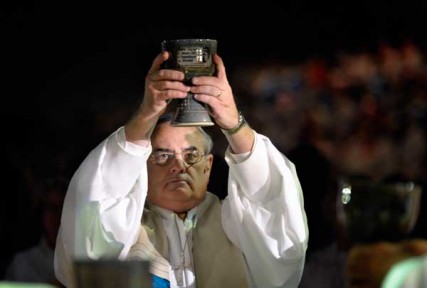
As nearly 1,000 delegates from across the world gather in Tampa, Fla., for the United Methodist Church's General Conference, gay and lesbian activists have printed pamphlets promoting their cause in five languages, including Portuguese and Swahili.
The UMC's global reach, stretching from the Philippines to Philadelphia, compels the multilingual lobbying. Nearly 40 percent of the delegates, who meet through May 4, live outside the United States, according to church leaders.
“We see it as a challenge to deal with the cultural differences,” said Bishop Rosemarie Wenner of Germany, who will be installed in Tampa as president of the UMC’s Council of Bishops. “But we also see it as a gift.”
Convened every four years, General Conference legislates decisions on everything from pensions to prayer books. But few debates garner as much attention and acrimony as the role of gays and lesbians in the UMC.
The homosexuality debate dates to 1972, when a phrase calling homosexual activity “incompatible with Christian teaching” was added to the Book of Discipline, which contains the denomination's laws and doctrines. The UMC also bans noncelibate gay clergy and same-sex marriage.
The UMC's long and painful membership decline in the U.S. looms over the debate, as church leaders search for ways to reverse the decades-long drop.
Gay rights activists argue that the UMC must become more inclusive to attract young Americans who view the sexuality prohibitions as hypocritical. Conservatives counter that only churches that hold fast to traditional doctrines are growing.
United Methodists who support gay rights have proposed about 100 resolutions this year that would lift the bans and excise the “incompatible” phrase from the Book of Discipline. Leading up to General Conference, they argued that momentum is on their side.
For example, last year a UMC court barely punished a Wisconsin minister who sanctioned a same-sex marriage; more than 1,200 retired and active UMC clergy have pledged to perform gay marriages; surveys show young Christians generally support gay rights; and other mainline Protestants — including Episcopalians, Lutherans and Presbyterians — have adopted gay-friendly policies in recent years.
Conservatives counter that all of those churches have subsequently split, with traditionalist congregations packing up and starting new denominations.
Gay and lesbian Methodists acknowledge that their church's complexity presents unique challenges. For example, their General Conference includes delegates from states where gay marriage is legal, but also from countries like Liberia, where “voluntary sodomy” is a crime.
“Our structure is different, so that has impacted how we move on these concerns,” said Ann Craig, a United Methodist and gay activist who witnessed votes by the Evangelical Lutheran Church in America and Presbyterian Church (USA) to allow partnered gay clergy.
“We’re going to move together when we move,” Craig said of her own UMC.
But others argue that trends favor traditionalists.
For example, the UMC’s membership in the United States has fallen to 7.8 million, while it has grown to 4.4 million abroad, mainly in Africa and the Philippines, where homosexuality is denounced. As those numbers shift, so does the balance of power, since delegates to General Conference — the only church body that can change the homosexuality bans — are apportioned based on membership.
Compared to the 2008 General Conference, this year there are 100 fewer delegates from the U.S. and 100 more from abroad, according to Mark Tooley, a United Methodist and president of the conservative Institute on Religion & Democracy. “With that lineup, a major shift would be unlikely,” said Tooley.
In addition, UMC growth is stronger in the Bible Belt than in the relatively liberal West and Northeast, said Russell Richey, co-author of a two-volume history of Methodism in the United States and former dean of the Candler School of Theology at Emory University in Atlanta.
Some United Methodists argue that policy should be set by regional conferences and reflect local mores.
For example, pastors who live where gay marriage is legal should be permitted to wed same-sex couples in their congregations, said the Rev. Dean Snyder, senior pastor of Washington's Foundry United Methodist Church.
Foundry proposed a resolution that would allow churches in six states and the District of Columbia to celebrate same-sex marriage, and sent 50 volunteers to Tampa to lobby for it.
Snyder said his church has celebrated about 10 same-sex weddings since 2010, when D.C. legalized gay marriage. That admission could place the longtime pastor’s career in jeopardy if UMC policy is not changed at General Conference.
“We are really praying that General Conference makes some movement,” Snyder said. “It’s going to be very disappointing if there is no movement at all.”






